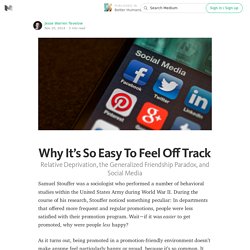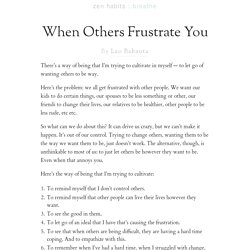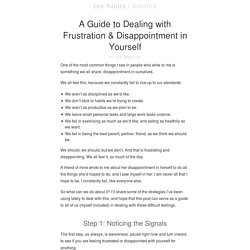

Why It’s So Easy To Feel Off Track. Relative Deprivation, the Generalized Friendship Paradox, and Social Media Samuel Stouffer was a sociologist who performed a number of behavioral studies within the United States Army during World War II.

During the course of his research, Stouffer noticed something peculiar: In departments that offered more frequent and regular promotions, people were less satisfied with their promotion program. Wait―if it was easier to get promoted, why were people less happy? As it turns out, being promoted in a promotion-friendly environment doesn’t make anyone feel particularly happy or proud, because it’s so common. It just makes the people who aren’t promoted feel horrible. Malcolm Gladwell discusses the concept of RD in David and Goliath, a book about underdogs. Relative deprivation is bound to happen as we move through life. In 1991, the sociologist Scott Feld discovered that people, on average, have fewer friends than their friends have. You can see how this creates a problem. When Others Frustrate You. By Leo Babauta There’s a way of being that I’m trying to cultivate in myself — to let go of wanting others to be way.

Here’s the problem: we all get frustrated with other people. We want our kids to do certain things, our spouses to be less something or other, our friends to change their lives, our relatives to be healthier, other people to be less rude, etc etc. Expectations. Disagreement. Failure. Learned Helplessness. Lack. Self-Control. Life Satisfaction. The Secret To Never Being Frustrated Again. Before we commence with the festivities, I wanted to thank everyone for helping my first book become a Wall Street Journal bestseller.

To check it out, click here. We all get frustrated. The guy in front of you is driving like an idiot. Your boss is being a jerk. Your partner isn’t listening. And sometimes these all happen to you on the same day. What’s the fix for this? Albert Ellis was quite a character. Clever but a bit unprofessional, right? Here’s what Wikipedia says about his system: In general REBT is arguably one of the most investigated theories in the field of psychotherapy and a large amount of clinical experience and a substantial body of modern psychological research have validated and substantiated many of REBTs theoretical assumptions on personality and psychotherapy. His stuff works. So how can you never be frustrated again? The Tyranny Of “Should” Let’s cut to the chase, shall we?
You don’t get frustrated because of events. And where did this idea start? A Guide to Dealing with Frustration & Disappointment in Yourself. By Leo Babauta One of the most common things I see in people who write to me is something we all share: disappointment in ourselves.

We all feel this, because we constantly fail to live up to our standards: We aren’t as disciplined as we’d like.We don’t stick to habits we’re trying to create.We aren’t as productive as we plan to be.We leave small personal tasks and large work tasks undone.We fail in exercising as much as we’d like, and eating as healthily as we want.We fail in being the best parent, partner, friend, as we think we should be.
We should, we should, but we don’t. And that is frustrating and disappointing. A friend of mine wrote to me about her disappointment in herself to do all the things she’d hoped to do, and I saw myself in her: I am never all that I hope to be. So what can we do about it? Step 1: Noticing the Signals The first step, as always, is awareness: pause right now and turn inward, to see if you are feeling frustrated or disappointed with yourself for anything. How to Stay Calm in Frustrating Situations.
“Holding on to anger is like grasping a hot coal with the intent of throwing it at someone else; you are the one who gets burned.”

~Buddha Uh-oh, you did it again. You fell into the same trap as last week. Perhaps someone was driving in front of you going 20 in a 55 mph zone, or maybe you received terrible customer service and couldn’t get your refund. So you snapped and lost your temper. Whatever the reason for your explosive reaction, you haven’t yet found a way to keep control and remain calm. Becoming impatient and losing your temper is sort of like smoking cigarettes.
But compounded over time it’ll secretly damage you from within by alienating yourself, negatively influencing your kids, and indirectly pushing your spouse or close ones away. Despite your situation being a big deal, you may not know where to begin to fix it. You feel powerless to control it, so you continue sweeping it under the rug. How I Unknowingly Inherited and Cultivated an Unwanted Trait. How frustration can make us more creative [ TED Talk : Tim Harford ]